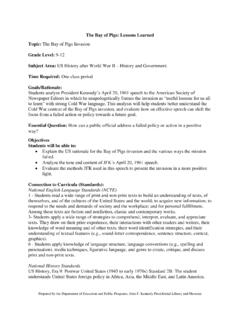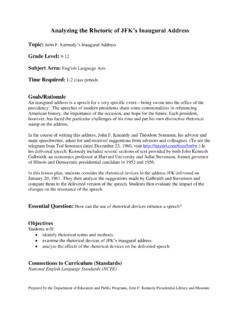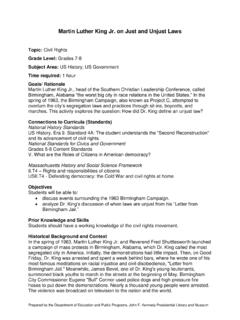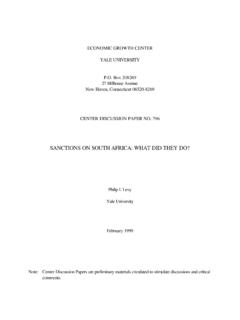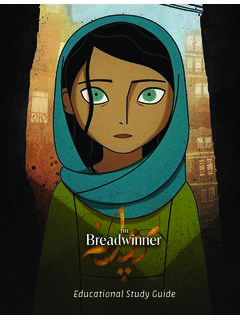Transcription of Interpreting JFK’s Inaugural Address
1 Prepared by the Department of Education and Public Programs, John F. Kennedy Presidential Library and Museum Interpreting JFK s Inaugural Address Topic: President Kennedy s Inaugural Speech Grade Level: 9- 12 Subject Area: US History Time required: 1 class period Goals/ Rationale President Kennedy s Inaugural speech addressed not only the American people, but also people throughout the world including newly independent nations, old allies, and the soviet Union. In this lesson plan, students are challenged to consider how the speech might have resonated with some of these audiences.
2 Essential Question: How can a speech or public statement resonate differently with various audiences, depending upon their point of view? Objectives Students will: discuss the significance of events leading up to Kennedy s inauguration. analyze the Inaugural Address from three perspectives a young civil rights activist, a soviet diplomat, and a Cuban exile. evaluate the speech from one of these perspectives. Connections to Curriculum (Standards) National History Standards History: Postwar United States (1945 to early 1970s), Era 9: 2A: The student understands the international origins and domestic consequences of the Cold War.
3 3B: The student understands the New Frontier and the Great Society. MA Framework : Analyze how the failure of communist economic policies as well as resistance to soviet military and diplomatic initiatives contributed to ending the Cold War. (Seminal Primary Document to Read: JFK s Inaugural Address ) USII. 28: Analyze the important domestic policies and events that took place during the presidencies of Presidents Kennedy, Johnson, and Nixon. Prior Knowledge and Skills Students should have a working knowledge of the Cold War, Civil Rights Movement, and the major events following World War II.
4 Students should also know how to analyze a piece of text, and draw their own conclusions. Prepared by the Department of Education and Public Programs, John F. Kennedy Presidential Library and Museum Historical Background and Context On January 20, 1961, a clerk of the Supreme Court held the large Fitzgerald family Bible as John F. Kennedy took the oath of office to become the nation s 35th president. Against a backdrop of deep snow and sunshine, more than twenty thousand people huddled in 20-degree temperatures on the east front of the Capitol to witness the event. Kennedy, having removed his topcoat and projecting both youth and vigor, delivered what has become a landmark Inaugural Address .
5 His audience reached far beyond those gathered before him to people around the world. In preparing for this moment, he sought both to inspire the nation and to send a message abroad signaling the challenges of the Cold War and his hope for peace in the nuclear age. He also wanted to be brief. As he d remarked to his close advisor, Ted Sorensen, I don t want people to think I m a windbag. He assigned Sorensen the task of studying other Inaugural speeches and Lincoln s Gettysburg Address to glean the secrets of successful addresses. The finely crafted final speech had been revised and reworked numerous times by Kennedy and Sorensen until the president-elect was satisfied.
6 Though not the shortest of Inaugural addresses, Kennedy s was shorter than most at 1,355 words in length and, like Lincoln s famous speech, was comprised of short phrases and words. In addition to message, word choice and length, he recognized that captivating his audience required a powerful delivery. On the day before and on the morning of Inauguration Day, he kept a copy handy to take advantage of any spare moment to review it, even at the breakfast table. Having won the election by one of the smallest popular vote margins in history, Kennedy had known the great importance of this speech.
7 Following his Inaugural Address , nearly seventy-five percent of Americans expressed approval of President Kennedy. Materials Timeline of Cold War and civil rights events that occurred from January 1959 to January 20, 1961 JFK s Inaugural Address Three profiles of fictional individuals Procedure 1. Provide students with the handout Timeline: Kennedy s Inaugural Address which provides a chronology of of Cold War and civil rights events that occurred from January 1959 to January 20, 1961. Discuss the historical significance of these events. 2. Divide students into groups of 3-4.
8 3. Provide each group with one of three profiles of a fictional individual responding to the speech: (a) a young civil rights activist, (b) a soviet diplomat, or (c) a Cuban exile. 4. Have students to analyze the Inaugural Address and answer the questions associated with their individual. Prepared by the Department of Education and Public Programs, John F. Kennedy Presidential Library and Museum 5. Have students share their group s response with the entire class. Assessment For homework, have students role play the fictional individual and write a letter to President Kennedy voicing their reaction to the Inaugural Address .
9 Additional Resources Clarke, Thurston. Ask Not: The Inauguration of John F. Kennedy and the Speech that Changed America. Henry Holt and Company, 2004. Hershberg, Jim. Introduction. A Typical Pragmatist : The soviet Embassy Profiles John F. Kennedy, 1960. Cold War International History Project Bulletin 4 ( fall 1994), 64-67. ( soviet document provided by Vladislav M. Zubok, National Security Archive, translated by Benjamin Aldrich-Moody.) Or online: ; scroll through to page 64. Hill, Kenneth L. Cold War Chronology: soviet -American Relations, 1945-1991. Congressional Quarterly, Inc.
10 , 1993. Sorensen, Theodore C. Kennedy. Harper & Row, Publishers, 1965. Tofel, Richard J. Sounding the Trumpet: The Making of John F. Kennedy s Inaugural Address . Ian R. Dee, Publisher, 2005. Prepared by the Department of Education and Public Programs, John F. Kennedy Presidential Library and Museum Timeline Kennedy s Inaugural Address January 1, 1959 Fidel Castro takes power in Cuba. January November, 1960 17 African nations achieve independence. February 1, 1960 African American students stage sit-in at a segregated lunch counter in Greensboro, NC. February 20, 1960 Whatever the exact facts may be about the size of the missile gap, it is clear that we shall need more missiles, more ships, planes and men, more atomic submarines and airlift mobility.
